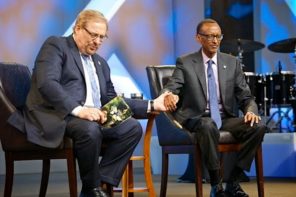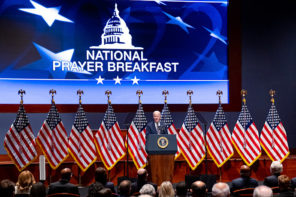Human Rights First, which last year gave its annual award to human rights advocate Julius Kaggwa for his work on behalf of sexual minorities, has issued a statement on the horrific murder of gay rights advocate David Kato. From its statement:
“The police must carry out a thorough investigation into this attack, including into the motives behind the actions of the perpetrator. We are concerned by reports that the police may have hastily qualified the attack as aggravated robbery. We call on Ugandan President Museveni to send an unequivocal signal to Ugandans and to the world, condemning and demanding an impartial investigation into the murder, and taking steps to ensure the security of LGBTI activists and individuals,” said Paul LeGendre, HRF’s Fighting Discrimination Program Director.
David Kato worked as an advocate and litigation officer for Sexual Minorities Uganda (SMUG). In October 2010, the Rolling Stone, a self-made magazine, included Kato’s name in the list of prominent gay rights activists and their contact details, with a banner over the photos calling to “Hang Them.” A notable supporter of this “initiative” was David Bahati, the Ugandan parliamentarian who achieved international notoriety for introducing the “Anti-Homosexuality Bill of 2009,” a bill that sought to introduce the death penalty for certain same-sex consensual acts. Commenting on the Rolling Stone article, Mr. Bahati said that the campaign “would have been very helpful to law enforcement of these people; it would have been a great source for law enforcement.”
David Kato was one of three litigants to initiate a court challenge to Rolling Stone and on January 3 of this year, the High Court of Uganda ruled that the newspaper had violated the plaintiff’s constitutional rights to dignity and privacy and issued a permanent injunction.
“We can only hope that David’s murder will serve as a wake-up call to Uganda’s leaders of the dangers of silence and inaction in the face of the deadly homophobic environment that has taken root in Uganda and to which many political and religious leaders – in Uganda and abroad – have contributed.” said LeGendre.
For the best account of Bahati’s bill, read Jeff Sharlet’s chilling C Street: The Fundamentalist Threat to American Democracy. Sharlet’s meticulous reporting on Bahati himself and the role of American religious advocates in the politics around the Anti-Homosexuality Bill and homophobia in general in Uganda is absolutely indispensible.
Human Rights First gave its annual award last year to activist Julius Kaggwa for his advocacy for sexual minorities in Uganda. When I interviewed Kaggwa last year, he warned that homophobic thugs, enabled by the state, see gays as a group “is defenseless, helpless, and is saying, we can just exterminate them. And using all means possible.” Now Kaggwa’s most dire warning has come to pass.
As Candace noted, this all has happened while American evangelicals either actively promoted homophobia, downplayed the urgency of the situation, or engaged in dishonest doublespeak after bolstering Uganda’s AHB supporters. As has been extensively documented by Political Research Associates, and as Lou Engle’s visit to Uganda last year made clear, American religious right figures played an important role in fanning the flames of homophobia in Uganda. Scott Lively linked it to Nazism and genocide. Engle argues that the bill’s drafters were taking a “principled stand,” and that “there needs to be some kind of restraint from the homosexual agenda being able to roll over this, a nation that does not want it.”
Preachers like Engle help generate panic by painting a picture of a nation “roll[ed] over” by evil homosexuals. As I wrote after interviewing him last year:
It speaks volumes that Engle was surprised that calling homosexuality “wrong,” saying it can “sweep” into an educational system, can cause the church to “lose its privilege,” and will “trump religious rights” would be controversial. But that’s where the religious right is in the United States — and he thinks that’s a completely uncontroversial position.
Since Engle brought up “the homosexual lobbyists” and “worldwide kind of bullying of Uganda” over the bill, I asked him how the U.N. and other “lobbyists” were promoting homosexuality in Uganda; not surprisingly, he didn’t have an answer. He claimed that the pastors there told him “a story about how it swept into — the agenda promotion, of the agenda, and now the actual proliferation of the homosexual activity sweeping into the boarding schools of that nation. I don’t know much of the details so I can’t take responsibility for what I was being communicated.”
Yet Engle thinks it’s completely justifiable for the Ugandans to try to “protect” the country from homosexuality, telling me, “These leaders, Sarah, are actually simply trying to protect their society, their people, from an agenda that’s just not welcome,” and that they “were just wanting to do the right thing for their church and their nation.”
It’s been clear for some time just how much Uganda’s persecuted sexual minorities need to be protected from being terrorized — and now it’s more clear than ever just how far that terrorizing will go.




